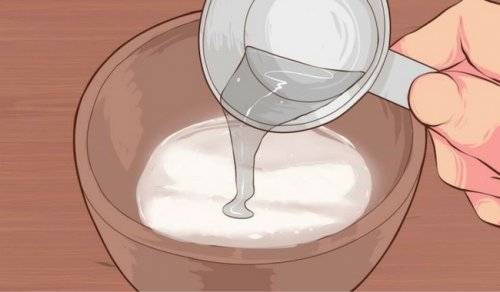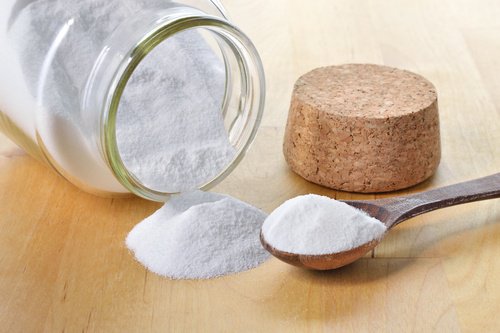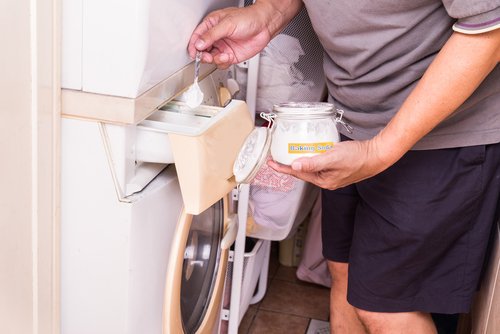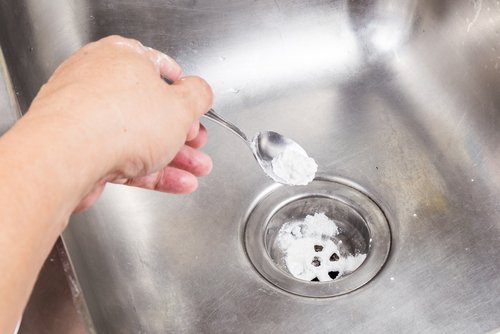Best Ways to Use Baking Soda on Laundry

Baking soda is an excellent deodorant as well as a natural cleaning agent. When you use baking soda on laundry, it enhances the effects of your detergent and helps keep your white clothes even whiter. It’s also great for keeping your washing machine squeaky clean.
Advantages of Using Baking Soda on Laundry

By using baking soda on laundry, you are helping to protect the environment. It’s common knowledge that regular detergent is made with aggressive ingredients that can be harmful to the planet.
- Baking soda softens the wash water and aids in the formation of bubbles.
- This ingredient is great for balancing the pH levels of the water in your washing machine, meaning your clothes will be whiter and cleaner.
You might like:
6 Tricks to Remove Oil Stains From Clothes
- Since baking soda is an excellent fabric softener, you can add half a cup to your rinse cycle to replace your commercial softener.
- If you’re dealing with stained clothing, baking soda is great at removing stubborn and sticky splotches.
- If you use cold water (instead of hot) during the pre-wash cycle, both white and colored clothing will stay brighter.
Pre-wash your Clothes
To take advantage of its deodorizing properties, soak your clothes in a solution of baking soda and water overnight. This will give it time to effectively eliminate unwanted odors from your clothing.
This is a great option for towels and items with tobacco, smoke, mold, and sweat odors.
Ingredients
- 1 cup of baking soda (200 g)
- 4 liters of water
Instructions
- Combine these two ingredients in a bucket or large bowl. Place your clothing in the water until they are well-soaked and add more water if needed.
- Leave your clothes to soak overnight and they’ll be ready to wash the next day.
How to Add Baking Soda to a Load of Laundry

- Add half a cup of baking soda to the washing machine once it’s completely filled with water. This will help you make sure the baking soda dissolves properly.
- Then, continue the wash cycle as usual.
- If you’re washing a large load, you can add up to 1 measuring cup of baking soda.
- Interestingly enough, vinegar is another useful cleaning solution. To improve the deodorizing effects of the baking soda, add a cup of white vinegar to your wash water, as well.
Hanging Your Laundry Out to Dry
Did your laundry smell like smoke, mold, or sweat before you put it on to wash? If so, the best way to dry it is by hanging it up outside.
The wind and the sun will help get rid of any lingering odors, and your laundry will dry quickly.
You might like:
7 Tricks for Getting Rid of Pesky Wardrobe Odors
You can even hang your clothes out to dry on a cold winter’s day, but you have to hang them up in a sunny area for this to work.
The other option is using a dryer. Once your laundry is dry and the cycle has ended, it’s a good idea to smell your clothes and decide whether you need to wash them again.
How to Remove Stains with Baking Soda

Baking soda is also a natural stain remover, and it is gentle enough to be used with all kinds of fabrics.
Ingredients
- 1 tablespoon of baking soda (10 g)
- Water
Instructions
- To begin with, all you need to do is form a paste with baking soda and a little bit of water. You can also substitute the water for either hydrogen peroxide or vinegar.
- This paste is perfect for removing all kinds of stains, including oil, grease, mud, and food.
- To apply it properly, lightly rub the paste on the stain. Make sure to cover the entire stain and the surrounding area. (Especially around the edges.)
- Let it sit for 15 minutes.
- If the stain is on tough fabric, you can scrub it using an old toothbrush. Never try to scrub delicate fabrics like silk or satin, though, because it could weaken the fibers.
Finally, rinse your clothing with plenty of warm water to remove any excess. However, when working with more delicate fabrics, it’s best to use a wet cloth, instead.
As you can see, using baking soda on laundry is a great alternative to commercial products. So, what are you waiting for to try it out?
All cited sources were thoroughly reviewed by our team to ensure their quality, reliability, currency, and validity. The bibliography of this article was considered reliable and of academic or scientific accuracy.
- Moro, A. (2011). Las increíbles propiedades del bicarbonato de sodio. Retrieved from https://xochipilli.files.wordpress.com/2012/01/bicarbonato-de-sodio-remedios-y-usos.pdf
- Romero, X., Navarro, P., & Noguera, J. (2005). Acidez y pH. Escuela Venezolana para la Enseñanza Química(Vol. 1, p. 49). Universidad de Los Andes. Retrieved from http://www.saber.ula.ve/bitstream/123456789/16739/1/acidez_ph.pdf
- da Silva Aquino, I., Oporto, JCS, da Silva, JL et al. Environ Monit Asesoría (2016) 188: 644. https://doi.org/10.1007/s10661-016-5654-z</span>
This text is provided for informational purposes only and does not replace consultation with a professional. If in doubt, consult your specialist.








